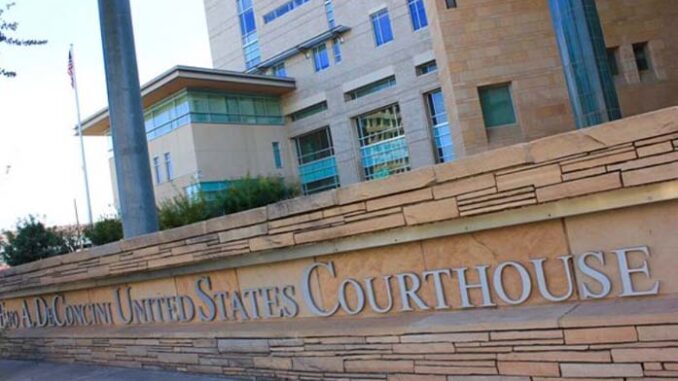[ad_1]

Do Arizonans have a constitutional right to pick how their ballots are tabulated, and if so, is a hand count more reliable than a count conducted by electronic voting equipment used the state’s two largest counties?
That is the essence of hearing held July 21 in a federal lawsuit filed earlier this year by State Rep. Mark Finchem and gubernatorial candidate Kari Lake against Arizona Secretary of State Katie Hobbs and the boards of supervisors for Maricopa and Pima counties.
Finchem and Lake want U.S. District Judge John Tuchi is issue a preliminary injunction barring the use of electronic tabulation equipment in Arizona for the Nov. 8 General Election. Their lawsuit alleges electronic voting tabulation machines could potentially fall victim to malware and hacking, making it less reliable than having more than 2 million ballots counted by hand.
The lawsuit is funded by MyPillow CEO Mike Lindell, who is accepting donations (non-tax deductible) through the Lindell Legal Offense Fund to defray the cost of various election related lawsuits. Taxpayers across Arizona are footing the legal bills for the state and county defendants.
A hearing conducted July 21 featured several county elections officials and employees who testified in support of the current voting systems used in Arizona. . Several witnesses also testified for the plaintiffs, but Tuchi has given attorneys for Finchem and Lake until July 28 to make arguments as to why he should not ignore the testimony of four people called as expert witnesses.
Under the Federal Rules of Evidence, expert testimony must be deemed “reliable, relevant, and qualified.” The day before the hearing, attorneys for Secretary of State Katie Hobbs filed a motion argument that Logan and four other planned expert witnesses for the plaintiffs did not meet that high bar.
According to Hobbs, two proposed witnesses did not claim to have any firsthand knowledge or experience with Arizona’s voting systems or election laws. A third was challenged for having “no relevant election experience or training or knowledge about tabulation or recording procedures” among other shortcomings.
Another disputed expert witness who testified was Ben Cotton, who worked with Cyber Ninjas last year on the Senate’s audit into how Maricopa County handled its 2020 General Election.
Cotton’s testimony included statements that a subset of Dominion’s voting systems contain wireless modems that can connect to unauthorized networks if the user has administrative access.
But according to Joseph LaRue, there are no modems in the Dominion Democracy Suite equipment used by Maricopa County. LaRue, a deputy county attorney, also struck back at Cotton’s suggestion that Maricopa County’s precinct-based tabulators contain an ethernet port that can be programmed to allow an external modem to be plugged in.
Some states enable port so that the modem can transmit tabulation results from the polling location to the central count facility. But that is not the case in any Arizona county.
“Maricopa County does not enable the port. It also affixes a tamper-evident seal to the port so that it cannot be accessed,” LaRue advised Tuchi.
Once the judge rules on the expert challenge he will then issue his ruling on whether to dismiss the lawsuit as requested in two motions, or issue an injunction barring the use of such equipment for the Nov. 8 General Election.
Tuchi has another option, which is to deny the injunction for now while letting the case move forward albeit not in time for the 2022 election cycle.
Election officials have previously warned that nearly 2 million ballots are expected to be cast in November in Maricopa County along. Some of those ballots will contain a dozen or more individual contests, meaning that a hand count as Finchem and Lake propose would require thousands of people over several weeks to complete the hand count process.
And officials tell Arizona Daily Independent that while Lake alleges computer tabulators can be “hacked very easily,” her hand count alternative ignores the fact dozens if not even hundreds of bad actors could easily be infiltrated into the hand count process.
The defendants also want Tuchi to reject Logan of Cyber Ninjas as a plaintiff’s expert witness, but his testimony on July 21 appeared to significantly bolster arguments by the Secretary of State and the counties that electronic tabulation is the best option.
Logan is the CEO of Cyber Ninjas and the man hired by Arizona Senate President Karen Fann last year to oversee the audit and conduct a hand count of the nearly 2.1 million ballots cast by Maricopa County voters. Another audit activity was to look for evidence of systematic fraud that could have allowed Donald Trump to be cheated out of tens of thousands of votes there.
While under oath, Logan testified to Tuchi that the Senate’s audit “found no direct proof” of computer tampering. He also testified that if properly programmed, machine counting is more accurate than hand counts by humans.
[ad_2]
Source link

